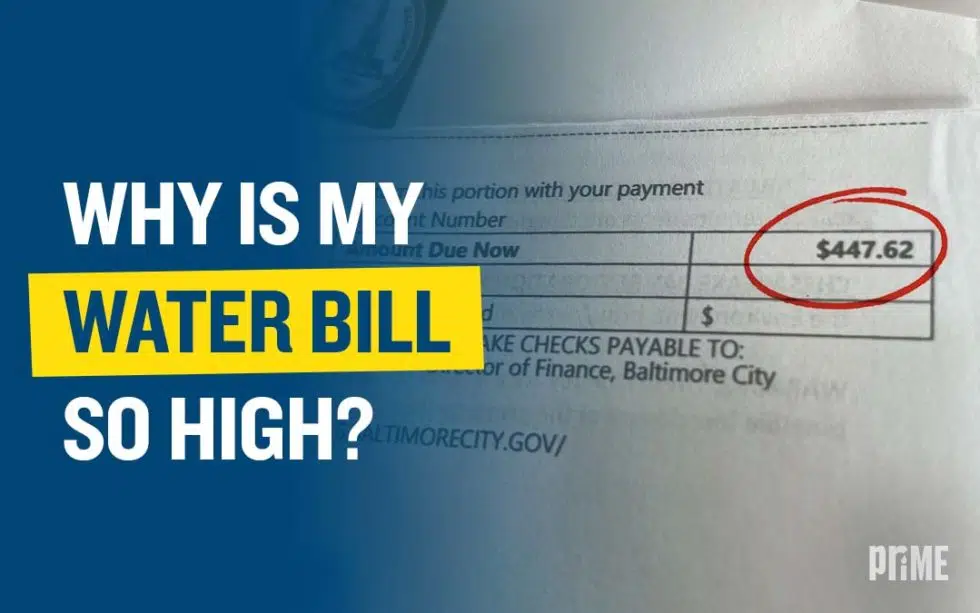Service 7 Days a Week
Proudly Serving Baltimore
Why Is My Water Bill So High?

Save Time, Call Prime!
Here’s a not-so-fun fact: According to the United States Environmental Protection Agency, American household leaks can collectively waste nearly 1 trillion gallons of water each year. If you’re struggling to wrap your head around just how much 1 trillion (with a “T”) gallons of water is, think of it this way for context—Baltimore’s Lake Montebello is only about 410 million (with an “M”) gallons, with a maximum storage of 606 million gallons. Your water bill may be impacted by a variety of factors:
- Leaky and running toilets
- Outdated fixtures
- Tending to your garden
- Welcoming guests or new additions
- Improperly programmed irrigation systems
It’s accurate to say these leaks have environmental and conservation implications, but they also impact water utility customers’ wallets. Leaks of all types are among the most likely culprits responsible for soaring water bills, but they aren’t the only factors to blame. If you’ve found yourself wondering why your water bill is so high lately, chances are it’s because of one of these reasons.
Leaky and running toilets
You’ve heard the old phrase, “flushing your money down the toilet,” right? That applies here. Toilets that aren’t functioning properly, leaking, or running constantly can significantly strain a customer’s water bill. Depending on how much the toilet is leaking and the cost of water, a leaky toilet could tack on several thousand dollars to your annual water costs.
The easiest way to check for a leaky or running toilet is to simply listen. If you hear the sound of running water or a hissing noise, you’ve got a problem on your hands. In most cases, a faulty flapper is to blame, which can be an easy and inexpensive fix for someone with even moderate household repair skills.
More of a visual person? You can also check for leaks using food coloring. Add a few drops to your toilet’s tank; if you see it start to seep into the bowl, that means you have a leak.
Outdated fixtures
We love the historic charm of a Baltimore rowhouse as much as anyone, but many of these classics have not been brought into the present when it comes to water fixtures. Outdated and inefficient fixtures such as toilets, showerheads, and faucets can cause water bills to go through the roof.
You’d be surprised at how reasonably priced new, more environmentally conscious fixtures actually are. Try swapping out any antiquated fixtures with low-flow water-saving models that’ll make you feel good when you go to pay your bill and about playing a part in the water conservation effort.
Tending to your garden
As the weather gets warmer, it’s time to start this year’s garden! A big part of keeping plants healthy is ensuring they get enough water—just make sure you turn off the sprinklers when you’re done. You don’t want to overwater your plants or run up your water bill! It’s also a good idea to replace any leaky hose bibs as soon as they appear.
Welcoming guests or new additions
Is your house the summer hot spot for the neighborhood kids? If so, you can expect to see a spike in your water bill. It may seem hard to believe, but the presence of household guests can impact water bills, causing an ebb and flow (no pun intended) in costs. And if you’re adding someone permanently to the home, like a new family member or roommate, that increased bill may become the new normal.
Having guests over can be a blast—especially in the summer when school is out and spirits are high—so we’d never want you to stop the party. Our suggestion here would be to just plan for the months that you think the bill might be a little higher than usual and try to keep the wasting of water to a minimum.
Improperly programmed irrigation systems
Speaking of summer, it’s time to kick those irrigation systems into overdrive to ensure your lawn and plants aren’t wilting in the summer sun. Unfortunately, a lot of people think more is better when it comes to using sprinklers, which results in improperly programmed irrigation systems, a lawn that’s drowning, and an unexpectedly expensive water bill.
A lot goes into determining how much, how long, and how often you should water your lawn. A quick measurement hack: set an empty tuna fish can in your yard when you run your sprinklers. Monitor how long it takes to accumulate about an inch of water and use that time as a guide for appropriate sprinkler use. A good rule of thumb is to aim for about 1.5 inches of water on your grass each week, with watering taking place early in the morning before the sun comes out.
Of course, there are many other reasons why your water bill could be higher than normal, but these big four are among the most common during this time of year. While we can’t help you with those guests who overstay their welcome, we can assist with any leaks in your home that are responsible for driving up your bill. When you need us, we’ll be there. Save time, call Prime!
The Difference With Prime
Get a FREE second opinion on water and sewer service, and septic repair/replacements!
Don’t Just Take Our Word for it

Why Choose Prime Plumbing?
Professional Services at an Affordable Price
- Transparent Pricing
- No Additional Charges for Overtime
- Flexible Financing Solutions
- Thorough Employee Background Checks
- Complimentary Second Opinions


